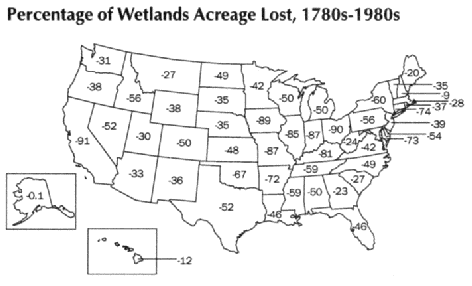Wow. So "no net loss" really means "We are accepting that we'll never get back the 30-90% of wetland acreage and functions that we already lost." From a conservation perspective, that is pathetic. Now let's look at what our esteemed wetland regulators are actually doing to preserve the functions and acreage of the remaining 10-70% of wetland acreage in the United States.
The Army Corps of Engineers, charged with protecting wetlands and streams with interstate connections, approves over 80% of all impact requests (filling, draining, dredging), and the agency has historically bragged to developers and Congress that they approve over 99% of completed applications for such impacts (many permit applications come with sketchy information and inadequate documentation, and are not deemed "complete").
So what about the "replacement" or mitigation, for these impacts, which is critical to achieve the elusive "no net loss" of wetland and stream acreage? One study found that permittees routinely recreate less than 50% of the required acreage. To say nothing of the "functional replacement" of the wetlands approved for filling/draining. In a similar study in Colorado, over 50% of designed mitigation wetlands were constructed smaller than promised. Other studies have shown that while "some" mitigation wetlands achieve the required acreage, none of them achieve the functional requirements and needs stipulated by scientists and regulatory agencies.
In fact, in 2005, the US Governmental Accounting Agency issued a report whose actual title was - I kid you not - "Corps of Engineers Does Not Have an Effective Oversight Approach to Ensure that Compensatory Mitigation is Occurring." Ouch! I mean - that's just the title!!!! It goes into 47 pages of detail on the topic.
I've been in meetings with Corps managers since that report, and those staff have basically said, "This surprised us - we'll get right to it!"
But it shouldn't have surprised them. Witness the 1988 GAO Report, entitled, "The Corps of Engineers' Administration of the Section 404 Program." From the report:
"Undetected (wetland and stream) violations of permit requirements may be occurring. Also, some suspected unauthorized activities reported to the Corps may not be investigated for months after they are reported, and many projects are not inspected by the Corps for compliance with permit conditions."
Hmm. So....how the Corps was surprised in 2005, when they (and Congress) were informed of the same issues in 1988 is a little beyond me. How in the world can these federal agencies be claiming "no net loss of wetlands" with straight faces, as they are consistently documented as not having even laid eyes on wetland impact and replacement/mitigation projects? Certainly is a mystery to me.
Then we can head back to 2004, when the GAO issued a report to Congress entitled, "Corps of Engineers Needs to Evaluate its District Office Practices." The main theme? Even though every office of the Corps of Engineers follows the same federal laws and standards, there is little to no consistency across the country of what, and how, and why the Corps of Engineers might enforce. This inconsistency and failure to follow official federal protocol has led to 15 years of crushing defeats in the US Supreme Court (and DC Federal Court, whose rulings impact Corps Headquarters, and thus, all Corps offices) that have drastically undercut the federal government's ability to regulate interstate waters and wetlands. That's right, incompetence did that.
And there's more:
GAO 2005: "Army Corps Needs to Better Support its Decisions"
GAO 1993: "Scope of 404 Program Remains Uncertain" (22 years after passage of Clean Water Act)
The sad fact is that when a federal wetland regulator states that "this impact" or "that impact" are not allowed and would not receive a permit, they are generally lying. The documents linked above, and hundreds of similar documents and court findings, have shown that our federal wetland regulations, and regulators, are not particularly effective at protecting a whole heck of a lot, particularly once politics, money, constitutionality, and basic professional competence and protocol come into the picture.
| Source: USFS |







